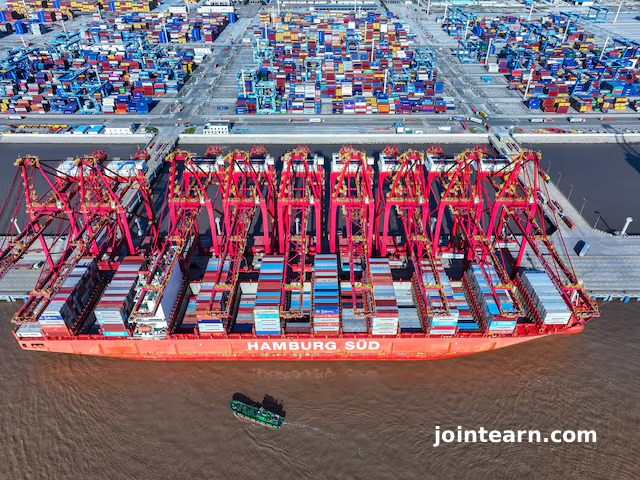
WASHINGTON, October 18, 2025 — U.S. Treasury Secretary Scott Bessent announced that he will meet with Chinese Vice Premier He Lifeng next week in Malaysia to prevent an escalation in U.S. tariffs on Chinese goods. The high-level meeting aims to revive dialogue between the world’s two largest economies amid mounting trade tensions triggered by President Donald Trump’s recent tariff threats.
Bessent confirmed the meeting after a call with He Lifeng on Friday evening, saying on social platform X that the two sides had “engaged in frank and detailed discussions regarding trade between the United States and China.”
China’s state news agency Xinhua echoed that sentiment, describing the exchange as “candid, in-depth, and constructive,” and confirming plans for a new round of bilateral trade talks “as soon as possible.”
Malaysia Becomes Ground Zero for U.S.-China Trade Diplomacy
The upcoming meeting in Malaysia marks a shift in venue for the ongoing trade negotiations, previously held across four European cities over the past six months. Those meetings produced a temporary tariff truce that reduced duties from triple-digit levels, but the agreement is set to expire on November 10.
Malaysia, a key Southeast Asian exporter with deep trade ties to both nations, is now at the center of the global economic standoff. The country currently faces a 19% U.S. import duty and a potential 100% tariff on semiconductor and electronics exports, following Washington’s national security trade review.
Trump: “It’s Not Sustainable, But That’s What the Number Is”
President Trump has blamed Beijing for the renewed tensions, citing China’s expanded export restrictions on rare-earth minerals and magnets — materials vital to global tech manufacturing.
In an interview with Fox Business Network, Trump said he would impose an additional 100% tariff on Chinese imports starting November 1 unless China removes those restrictions.
“It’s not sustainable, but that’s what the number is,” Trump said. “They forced me to do that.”
Trump also signaled his intent to meet with Chinese President Xi Jinping in South Korea in two weeks, expressing cautious optimism.
“I think we’re going to be fine with China, but we have to have a fair deal. It’s got to be fair,” he said.
Market Reaction: Stocks Recover as Trade Hopes Revive
Wall Street showed signs of recovery late Friday after Trump’s remarks about renewed dialogue with China. U.S. stocks, which had slumped earlier in the week amid fears of a trade escalation and banking sector instability, rebounded modestly in afternoon trading.
Bessent and U.S. Trade Representative Jamieson Greer have sharply criticized China’s export controls, calling them a “direct threat to global supply chains.” The U.S. has warned that further restrictions on critical materials could accelerate supply disruptions in industries from semiconductors to defense technology.
WTO Chief Warns Against U.S.-China Trade Decoupling
World Trade Organization (WTO) Director-General Ngozi Okonjo-Iweala urged both nations to de-escalate trade tensions, warning that a long-term economic decoupling between the U.S. and China could shrink global output by up to 7%.
“The WTO is extremely concerned about the latest spike in U.S.-China trade tensions,” Okonjo-Iweala told Reuters, confirming that she had spoken with officials from both countries to encourage dialogue.
Despite these efforts, tensions remain high. The Chinese Commerce Ministry accused Washington of undermining the multilateral trading system and said it would intensify WTO dispute settlement actions against U.S. trade measures deemed discriminatory.
Bessent Urges Tougher IMF and World Bank Action on China
In a separate statement to the International Monetary Fund (IMF) steering committee, Bessent called on global institutions to adopt a firmer stance against China’s “state-driven economic practices” and industrial overcapacity, which he argued have distorted global manufacturing and trade flows.
Bessent said these imbalances are leading to “a flood of cheap goods” in global markets — a claim long made by U.S. officials who accuse China of over-subsidizing its domestic industries.
High Stakes Ahead of Trump-Xi Meeting
The Malaysia meeting could prove pivotal in shaping the next phase of U.S.-China economic relations. With both sides facing domestic and international pressure to stabilize markets, the world will be watching whether Washington and Beijing can prevent another round of damaging tariff escalations.
The U.S. and China’s next high-profile encounter will occur when Trump and Xi meet in South Korea later this month — a summit that could determine whether the fragile trade truce holds or collapses.


Leave a Reply